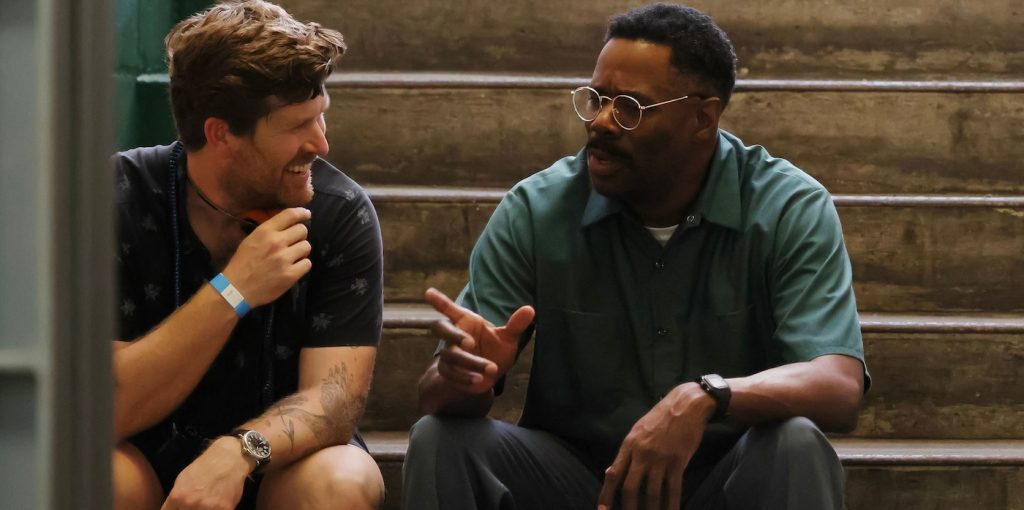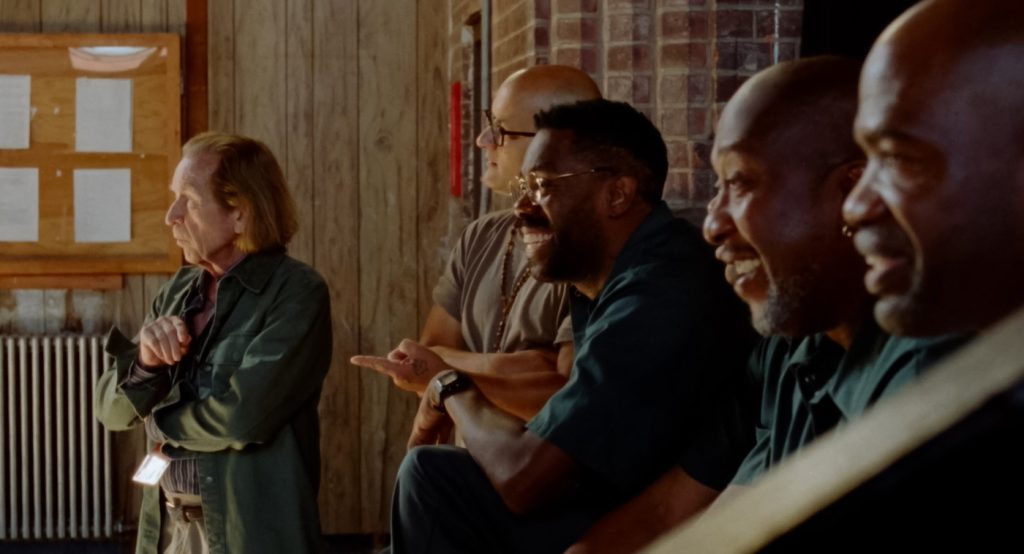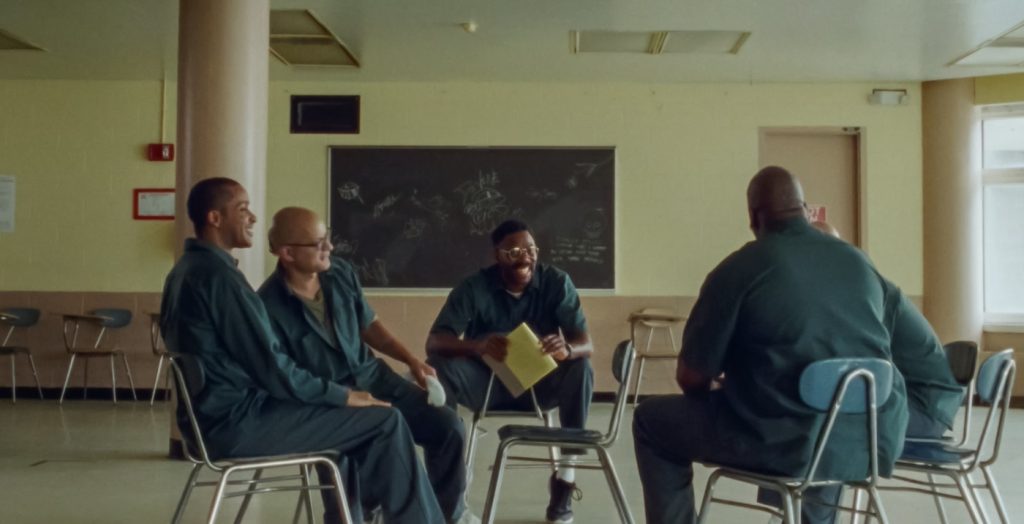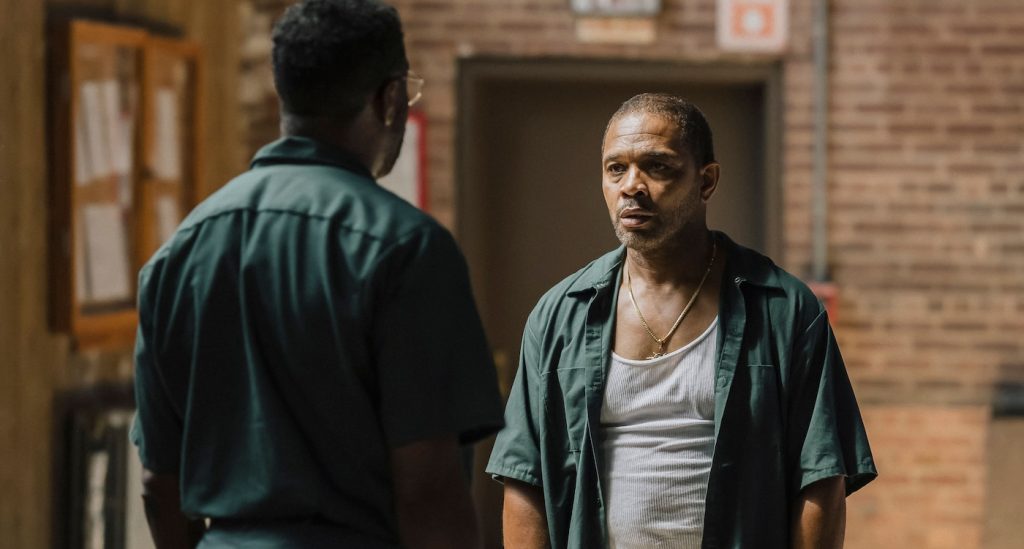All the World’s a Stage: The Team Behind “Sing Sing” on Crafting a Powerful Human Drama
Sing Sing screenwriters Greg Kwedar and Clint Bentley are unusual, even in the world of indies. They immerse themselves in the world of the story they want to tell for years, in this case a drama program in a maximum-security prison. They surround professional performers like Colman Domingo in the case of Sing Sing, with real-life inhabitants of that world, with a seamless naturalism that straddles documentary and narrative filmmaking. And everyone is a full partner in the production. Actors, producers, and crew all get paid the same, and all get the same share of the movie’s revenues. They do this because they think it is fair. More important to them is how literal ownership of the project brings everyone together.
Speaking with The Credits, Kwedar, who also directed, Bentley, producer Monique Walton, and formerly incarcerated-turned-actors John ‘Divine G’ Whitfield, Sean ‘Dino’ Johnson, and Jon Adrian ‘JJ’ Velazquez talked about what arts programs can do, including how the recidivism rate for participants in the program is just 3 percent, compared to over 60 percent for the rest of the imprisoned people, and more.
Greg, I understand that you worked on this script for many years, and then it suddenly came together for you. What was the turning point?
Kwedar: That didn’t happen until about six years into our development process. The work that Clint and I have done over our careers together inherently takes time because of the process of building stories from the dirt up. We like to spend time in the community, listen, and let the story be born from that. It can take a few years to finally have that happen, to get that breakthrough. You could make a movie about every one of the men in this film, and so in earlier drafts, we tried to do that, telling all the stories. It was a process of finding its focus. Finally, we had this revelation that the best way to speak to the community of this program while having something to really attach to is to tell the story of a friendship. Once that was apparent to us, a lot synthesized from all the years, it literally fell out onto the page in a treatment in about 15 minutes. At the very bottom of that, I wrote, “Coleman Domingo as Divine G.”

You combine experienced, trained, professional actors with cast members who have the real-life experience of the people they are playing but are new to acting, or at least acting on film. How does that work?
Bentley: There’s always an amazing alchemy that happens when we put those two folks together. It’s not just that the trained actor comes in and carries these other folks along. It’s that they both learn from each other and grow from each other in different ways. We saw it on Jockey, and we saw it here a lot of times. There’s something about stepping into drama and dramaturgy, with actors channeling the interiority and depth of these feelings and things happening within the program that help transcend to a higher plane of truth. What’s beautiful about this process is the space for the world to breathe into it and have moments that, we always say, never could have been written but only lived. It’s how those dance together that leads us to an understanding that we couldn’t have arrived at with its independent parts.

How complicated was implementing your unusual revenue share and selling it to your financial partners?
Walton: Looking for a fresh idea, it was a compelling invitation. Can we think about this differently? Greg always talked about, let’s fully erase the hierarchy. That affected everything. Even in the structure of a budget, a film budget is typically above or below the line. He said, “I don’t want my budget to have a line. Take it out.” And I was like, “I don’t know how to do that. It’s a program. It’s built that way. You want me to go into the code?” Ultimately, when it’s shared, it’s one of those ideas people start to think about. Because your instinct is like, “Oh, that could never work. But then we did it, and it worked.”
Kwedar: And what that starts to do is migrating a team of artists from an employee to a partner mindset. And once you’re like an actual stakeholder in the work, the transformative act of that has everyone saying, “If I’m ever going to empty the tank on a project, if I’m ever going to put it all on the line, I’ll do it for one that I feel like really belongs to me.” Particularly within this film, the majority of our cast being formerly incarcerated and bringing their own life story to the project, to have literal ownership over their own story, speaks very loudly to all of us in the process of making it, particularly for the men who really lived it.
Bentley: It is not that hard of a pitch to our partners because it’s not like charity. We joke that it’s a table where both capitalists and communists can sit down together and eat from the same plate. It just makes it an easier pitch to investors because you’re not asking them to do something that doesn’t work in their favor. It’s a way of making budgets more approachable in a place where every other budget is inflating so radically it is almost unsustainable; it allows investors to trust the filmmakers, and when the risk is lower, we can be bolder in the work. It actually brings artists and investors together to finally be able to see each other eye-to-eye.

How did you first get involved with Rehabilitation Through the Arts?
Johnson: I’m one of the founding members. Someone approached me in the yard and said, “Hey man, we want to get a couple of people together and start a theater program.” I thought it was a joke. Because we’re in a maximum security facility. I’m not running around with tights telling you what to be or not to be, you know? And show you how shallow my understanding of theater was; it was amazing because we came together as a community, and the more we read scripts and got into it, the more we started connecting with one another. We all realized how much we had in common. And it was an escape from the lifestyle of prison. It was an escape mentally, physically, and emotionally, you know.

In the film, we see the men’s unconditional support for each other. How is that created through the program?
Whitfield: It was built into the program. As founding members, Dean and I are the architects of our steering committee. So, when we interviewed individuals when they came into the program, we set the stage to let them know that you have to be a risk-taker for new behaviors because we are thinking outside the box. We prepared them and worked on them to make them understand that this was healthy for us and that this was work we had to do. You had to be an adventurous person when you came into RTA. So, it was kind of woven into the whole program. It was a struggle for some. Because it was new behaviors that were totally out of their range or out of their familiarity at the point of the experience. But as time progressed, guys started taking off the layers of the armor, layer by layer. Like peeling an onion, taking it off. It feels a little uncomfortable, but the more you get to the root of it, the guys start to understand.

Why do the men in the program call each other “Beloved?”
Whitfield: It was to get away from the n-word that people used even as a term of affection. When you have a historical comprehension of how dangerous and devastating it is and how much harm, destruction, murder, maim, and chaos that’s equated with that word, you have to come up with a way to combat it. And that was our way of trying to combat the use of that word, creating a substitute that would also tell guys that, listen, this word is not socially appropriate. It’s a harmful word. We also did a little more than just use the word Beloved. It is not in the movie, but if someone gets caught using the n-word out of habit, they have to acknowledge that they made a mistake and do 20 push-ups.
What do you want people to learn from this film?
Velasquez: I would love for them to walk away with a deeper understanding of the full and complex humanity of people incarcerated and understand that these are human beings. Human beings, when given the right equipment, the right ingredients, and the right circumstances, change. There is the power within humans to change, no matter where they’re at, no matter what’s going on. We are human beings, and we all can change.
Featured image: Coleman Domingo stars in “Sing Sing.” Courtesy A24.


